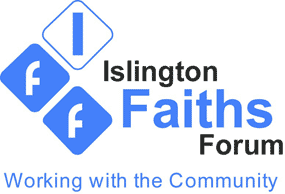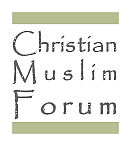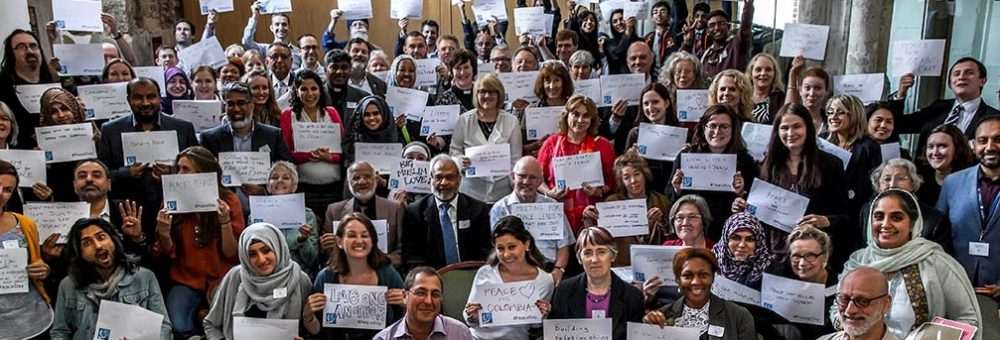
John Woodhouse kindly lent us this beautiful samovar from Moscow for our Tea in Multifaith Europe in November.
We didn’t use the samovar last Thursday, but the London Church Leaders treated us to refreshments at Westminster Central Hall.
It was Elizabeth Simon’s last day as their Executive Officer and she shared her reflections over the last 14 years. You can read here her perceptive account of the relationship between faith communities in the capital and government policy – the ‘how’ as well as the ‘what’ – within a changing national and international context.
Further contributions led to a rich discussion on regeneration, consultation, engagement, integration, empowerment, commissioning and the community co-production of public services. Wider thoughts on the enduring role of religious groups in social action were explored and how working in partnership with the local public sector can benefit the wider community, particularly those who depend on public services the most. How do we work closely with the public sector on strategy and service delivery whilst maintaining our place in public life, contributing to the public conversation – faith in the public square?
Karen Walkden of Flourishing talked us through a mindmap analysing the trends for faith groups in 2013. She highlighted how recent changes have made it difficult to be commissioned to provide services, “smaller organisations supporting specific communities can only get local authority funding if they are part of a consortium”. She added further comments by email.
Steve Miller of the Faith-based Regeneration Network looked at national government’s evolving attitude to religious and multireligious groups involved in social action in recent years – from ad hoc co-option of useful individuals to more formal consultations and instrumentalism. Optimism over tackling social exclusion (New Deal for Communities, Neighbourhood Renewal) gave way to the fear of terrorism (Prevent), and the funding relationship has changed from grants to contracts and commissioning. Whose agenda is it?
 Malik Gul spoke from 10 years’ experience of deepening involvement with the NHS, police and the local council in Wandsworth. Understanding how these systems work continues to be a significant task. How can we tackle the failure to serve marginalised communities? What makes it worthwhile for churches, mosques, temples, synagogues, gurdwaras to engage with public agencies? What needs to happen in order to bring these extensive social networks closer to the statutory services and vice versa? The co-production of public services (eg mental health) by local religious groups, locating them in places where people already are, has proved to be a successful prototype in Wandsworth. But where is the space for the conversations which lead to change and improvement?
Malik Gul spoke from 10 years’ experience of deepening involvement with the NHS, police and the local council in Wandsworth. Understanding how these systems work continues to be a significant task. How can we tackle the failure to serve marginalised communities? What makes it worthwhile for churches, mosques, temples, synagogues, gurdwaras to engage with public agencies? What needs to happen in order to bring these extensive social networks closer to the statutory services and vice versa? The co-production of public services (eg mental health) by local religious groups, locating them in places where people already are, has proved to be a successful prototype in Wandsworth. But where is the space for the conversations which lead to change and improvement?
 Evereth Willis and Eshaan Akbar described how the Local Strategic Partnership in Merton (many LSPs have disappeared in London) brings religious groups into strategic decision-making. Merton’s commitment to community groups is high and the Community Plan will be co-written by the Inter Faith Forum’s Chair. Food banks, services for the homeless and end of life care were mentioned, recognising the huge social capital contained within religious communities.
Evereth Willis and Eshaan Akbar described how the Local Strategic Partnership in Merton (many LSPs have disappeared in London) brings religious groups into strategic decision-making. Merton’s commitment to community groups is high and the Community Plan will be co-written by the Inter Faith Forum’s Chair. Food banks, services for the homeless and end of life care were mentioned, recognising the huge social capital contained within religious communities.
 Roz Miller of Islington Faiths Forum told us about IFF’s expanding partnership work with the local council and NHS on poverty and mental health (Best Practice and Networking Conference 20th March). Working with public agencies at a strategic level was the key, she said, and maintaining good relationships not only with local officers but with local councillors. But she is sometimes disappointed by their small and tentative vision for, for example, care in the community. A fully complementary role for faith communities could be immensely productive and reach those who need services the most, but often they are patronised and offered a small role.
Roz Miller of Islington Faiths Forum told us about IFF’s expanding partnership work with the local council and NHS on poverty and mental health (Best Practice and Networking Conference 20th March). Working with public agencies at a strategic level was the key, she said, and maintaining good relationships not only with local officers but with local councillors. But she is sometimes disappointed by their small and tentative vision for, for example, care in the community. A fully complementary role for faith communities could be immensely productive and reach those who need services the most, but often they are patronised and offered a small role.
Dr John Maiden and Gavin Moorhead described their Building on History work – how learning from the past can lead to a better future – and invited expressions of interest in being part of the project. They are looking for local religious and multifaith groups which would like to examine their histories and heritages – a great opportunity for those who get involved. Find out more here and contact Gavin for further details.
 LBFN’s advisory group is looking at a possible partnership with Haider Ali of the Open University to tell the story of the network and its members over the last 10 years. We will also consider some form of registration and public accountability; as a purely informal group we are not able to join, for example, the Inter Faith Network for the UK or the European Network on Religion and Belief.
LBFN’s advisory group is looking at a possible partnership with Haider Ali of the Open University to tell the story of the network and its members over the last 10 years. We will also consider some form of registration and public accountability; as a purely informal group we are not able to join, for example, the Inter Faith Network for the UK or the European Network on Religion and Belief.
IFN UK has asked LBFN’s convener to contribute to its Strategic Review. Many of you may well have contributed, but if you have any thoughts about IFN’s future in relation to London’s local religious and multifaith groups and their relationship to the public sector, please let me know so that I can include them in my response.
 The Christian Muslim Forum is looking for a few individuals in Tower Hamlets, Hackney, Southwark, Lambeth, Brent and Wandsworth to have a light lunch together in each of the boroughs. Over lunch (provided), they will use Conversations of the Soul as a way of understanding each other’s communities and to build stronger relationships across the Christian-Muslim boundary. It is hoped that some of the participants will be from the local authority, police or NHS – people whose work involves engaging local faith communities and who can use a lunch-break to widen their circle of contacts in an enjoyable way. Let me know if you are interested, or contact the CMF direct.
The Christian Muslim Forum is looking for a few individuals in Tower Hamlets, Hackney, Southwark, Lambeth, Brent and Wandsworth to have a light lunch together in each of the boroughs. Over lunch (provided), they will use Conversations of the Soul as a way of understanding each other’s communities and to build stronger relationships across the Christian-Muslim boundary. It is hoped that some of the participants will be from the local authority, police or NHS – people whose work involves engaging local faith communities and who can use a lunch-break to widen their circle of contacts in an enjoyable way. Let me know if you are interested, or contact the CMF direct.
Leave a comment below or send me any further reflections.

